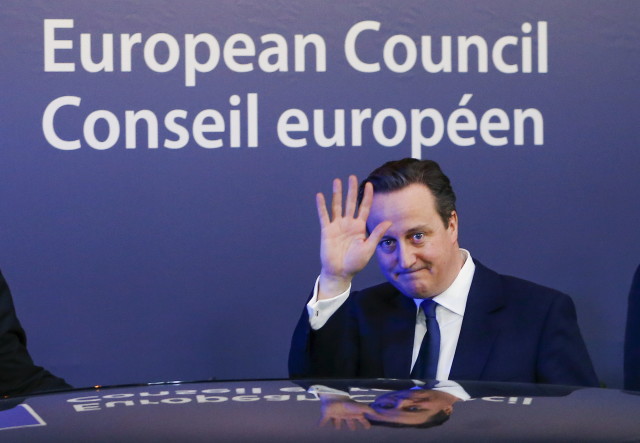by James Kirchick
Sometimes, when judging the merits of opposing arguments in a contentious debate, one can decipher the more just position merely by surveying the contestants on either side. The issue of whether or not the United Kingdom should remain within the European Union – which British voters will decide in a June referendum – is one such debate.
Arguing the status quo view are the U.K.’s most important strategic ally, the United States, with whom it has had a centuries-long “special relationship”; every European government as well as those of the British Commonwealth; and the majority of the country’s top businesses, whose CEOs fear the disastrous consequences that “Brexit,” as potential U.K. departure from the union is known, would have on the British economy.

British Prime Minister David Cameron waves as he leaves a European Union leaders’ summit in Brussels Feb. 20, 2016. Cameron said on Friday he would campaign with all his “heart and soul” for Britain to stay in the European Union after he won a deal about the so-called Brexit, in Brussels which offered his country “special status”. (Reuters)
On the other side? Vladimir Putin’s Russia, far right French National Front leader Marine Le Pen, and an assortment of other European radicals, populists, and xenophobes.
The reason these disparate forces are so eagerly egging on Brexit is not hard to understand: they all hunger to see the dissolution of the E.U. itself, and rightly believe that the U.K. leaving would set in motion a chain of events leading to that very result.
Russia in particular has made no secret of its desire on the Brexit question, a reflection of its wider campaign to support separatist movements across the continent. When Scots went to the polls in 2014 to consider an independence resolution, Kremlin-sponsored English-language media handed an enormous amount of airtime over to Scottish nationalists. They have similarly stoked nationalist fires as far afield as Catalonia in Spain and the Veneto region of Italy. An analysis of Russian government-sponsored, English language media reporting of the Brexit debate by The Interpreter found it to be “systematically one-sided coverage whose effect has been to magnify the ‘Out’ campaign and marginalize the ‘In’ campaign.”
Understandably, the Russians prefer a Europe that is hopelessly divided against itself on issues ranging from security to economics to foreign policy and migration. To a wily and mischievous Kremlin, it is far preferable to treat with 28 maximally sovereign nation states than a united Europe. In the absence of a European energy union, to take but one example of the fruits of further integration, Moscow can more easily perpetrate energy blackmail against the E.U.’s Eastern members. The same goes for the migration crisis, in which the majority of Syrian refugees fleeing their country’s civil war are escaping the barrel bombs of the Russian-backed Assad regime: the lack of a cohesive European foreign policy to counter Moscow’s moves in the Middle East has only made the problem worse.
European nationalists may not share the Kremlin’s geopolitical motivations in backing Brexit, but their goal is nonetheless the same. Imagining a mythical, pre-integrationist past where the continent’s many nations got along swimmingly, they act as if the greatest period of freedom, peace and prosperity in European history is something to be taken for granted, and that it could be maintained indefinitely if the E.U. were just abolished.
To be sure, there exist serious problems with the E.U., and the British people have substantial reason to reform the body from within. That was the purpose of Prime Minister David Cameron’s renegotiation of the terms of Britain’s E.U. membership, and Britain has long played a decisive role in making the E.U.’s single market a more dynamic and competitive economy – a role it will continue to play if it stays within the family. By mentioning the rogues’ gallery of international Brexit supporters, I do not mean to tar the campaign’s British advocates with the brush of guilt by association; as a friend of Britain, an admirer of its parliamentary democracy, and consumer of its cultural output, I believe that Britain’s E.U. membership is a matter to be decided by the British people and the British people alone. At the same time, those Brits who claim that it’s in the best interests of the U.K. to leave need to explain in turn to their fellow countrymen just what it is that has its allies urging it to stay and its adversaries urging it to go.

